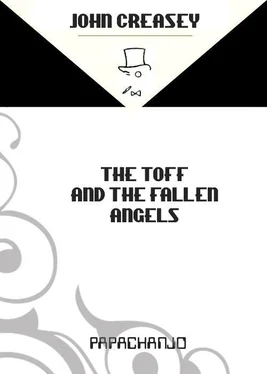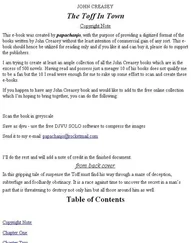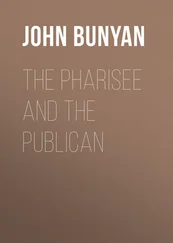John Creasey - The Toff and the Fallen Angels
Здесь есть возможность читать онлайн «John Creasey - The Toff and the Fallen Angels» весь текст электронной книги совершенно бесплатно (целиком полную версию без сокращений). В некоторых случаях можно слушать аудио, скачать через торрент в формате fb2 и присутствует краткое содержание. Жанр: Старинная литература, на русском языке. Описание произведения, (предисловие) а так же отзывы посетителей доступны на портале библиотеки ЛибКат.
- Название:The Toff and the Fallen Angels
- Автор:
- Жанр:
- Год:неизвестен
- ISBN:нет данных
- Рейтинг книги:4 / 5. Голосов: 1
-
Избранное:Добавить в избранное
- Отзывы:
-
Ваша оценка:
- 80
- 1
- 2
- 3
- 4
- 5
The Toff and the Fallen Angels: краткое содержание, описание и аннотация
Предлагаем к чтению аннотацию, описание, краткое содержание или предисловие (зависит от того, что написал сам автор книги «The Toff and the Fallen Angels»). Если вы не нашли необходимую информацию о книге — напишите в комментариях, мы постараемся отыскать её.
The Toff and the Fallen Angels — читать онлайн бесплатно полную книгу (весь текст) целиком
Ниже представлен текст книги, разбитый по страницам. Система сохранения места последней прочитанной страницы, позволяет с удобством читать онлайн бесплатно книгу «The Toff and the Fallen Angels», без необходимости каждый раз заново искать на чём Вы остановились. Поставьте закладку, и сможете в любой момент перейти на страницу, на которой закончили чтение.
Интервал:
Закладка:
And as he leapt and as Naomi cried out in alarm, the Toff vaulted over the wall and called in a sharp voice of command:
“Keep still! Don’t move!”
On the instant the assailant spun away from Naomi and towards the Toff, who now saw that there was a stocking drawn over the big face, making it quite unrecognisable. He saw, too, the murderous hammer swinging, not towards Naomi Smith but towards his own bare head.
Rollison flung up a hand to fend off the blow and swung to one side. He caught the other’s forearm on his own, and it was like a steel bar. Off-balance, he tried to pivot, sensing that his assailant would rush at him, knowing that a man of such strength would be dangerous and could be deadly. He caught a glimpse of the stocking-covered face; it looked like the face of an idiot. Too near for a punch to be effective, Rollison gripped the other’s wrist, and twisted in an attempt to heave the man over his shoulder. He failed. He caught a doubled knee, intended for the groin, on the inner side of his thigh.
He heard shouting : a woman, then a man, then several men.
He gripped again but the masked assailant pulled himself free, then swung away and leapt the wall, dis- appearing from sight, as two men rushed down the path towards Naomi Smith, who was standing like a figure carved from stone.
Voices broke, incoherently.
“What was it?”
“Where is he?”
“Is anyone hurt?”
There were a dozen useless questions while Rollison moved towards the wall and began to search the ground. There was so little light here. A policeman turned into the gate. As Rollison bent down, a young man joined him.
“Looking for something?”
“Yes.”
“I’ve got a torch.” There was a click, and a pale beam of light wavered over grass and the dark brick wall—and then shone on the heavy-looking head of a bricklayer’s hammer.
“What’s that?” the youth darted forward.
“Don’t touch it !” exclaimed Rollison, in time to make the other draw back.
Behind them, Naomi Smith was saying: “I’m all right, I am, really.” On Rollison’s right the policeman was bearing down and a number of other people had gathered in the gateway. Why did people have to stand and gape and watch when others suffered? What sadistic streak lay buried in man?
“Good evening,” said the policeman. He was slight but quite tall and had a faintly Scottish accent. “What’s happening here?”
“A man was waiting to attack whoever was coming out of the house, as far as I can tell,” answered Rollison. “I happened to spot him. He dropped this,” He pointed to the hammer, glad to notice that the policeman bending down, made no attempt to touch it. “The assailant got away.”
Was anyone hurt?” asked the constable, practically.
“I don’t think so,” said Rollison. “Unless he himself was. This is a hostel for young women, and—”
“I know what it is, sir,” said the policeman, and lowered his voice. “Aren’t you Mr. Richard Rollison?”
“Yes,” said Rollison simply.
“Is this anything to do with what happened at St. John’s Wood, sir?”
“From the look of that hammer it wouldn’t surprise me,” said Rollison. “Can you see that it’s left there until your C.I.D. men come and have a look round?”
“I certainly can, sir.” The policeman pulled out a knob in the transistor radio tucked into his tunic and began to report to his division with a lucidity which Rollison admired, and which gave him much relief : he did not need to guide this young officer into doing what he wanted. And other police were approaching, from the gate one spoke with the patient firmness of authority.
“Move along, please, you’re causing an obstruction. Move along.”
“Is anyone hurt?” floated from the gateway.
“Isn’t that the hostel where—”
“Move along, now! I don’t want to have to tell you again!”
“I’ll be inside,” Rollison said to the constable near him, as the man pushed the aerial in.
“Thank you, sir. We’ll have a car along in a very few minutes.”
Raison looked towards Naomi Smith, who was now standing in the porch with the door behind her open and the light throwing her in dark relief. The policeman and the youth, seeing that they could do nothing more for her, turned towards Rollison.
“Are you the Rollison?” the youth breathed. The—the Toff?”
“Yes,” answered Rollison, crisply. “Now I must look after Mrs. Smith. Why don’t you telephone me later tonight or sometime tomorrow? You’ll find my name in the book.”
“Oh—may I?” There was tremendous excitement in the young voice.
“I’d like you to,” said Rollison. “And thank you for your help.” He moved away, watched very intently now by everyone who was near, and joined Naomi Smith. “Let’s go in,” he said, and took her arm leading her towards the hall beyond.
No one was there.
Rollison noted that the hall was pleasantly bright and much better furnished than might have been expected. There were oil portraits on the wall; the chairs, an oak settle and a big wardrobe were all old and well-preserved. The parquet flooring was well-polished and there was a big Indian square—Mirzapore, Rollison thought. A central staircase ended at a half-landing from which another flight led to the right and to the left.
Looking down from a wooden rail were three girls. In the shadowy light up there, each looked pale and nervous and dark-eyed.
Why hadn’t they come downstairs?
He wished Angela was one of them.
Naomi led the way to a room on the right, and switched on ceiling lights revealing a room which was part office, part sitting room. The big square desk had a green leather top, so did a smaller desk near it, on the right. On the other side was a typing table. Here were two telephones, a terra cotta jar filled with ball-point pens, another with finely-sharpened pencils.
Naomi, her hair ruffled, turned and faced him, her expression one of dismay and distress.
“I suppose you realise you might have been killed,” Rollison said in a conversational voice : there was no point in hectoring her, that would only worsen her distress.
“I—I do. I can’t—thank you—enough.”
“You feared that two of your girls were dead, didn’t you?” asked Rollison in the same, almost casual tone. “Why didn’t you tell me?” When she didn’t answer, he went on : “I could forgive a lot of things, but not that kind of deceit. You reported the girls were missing to the authorities, yet you came to me and asked for help because you said you didn’t want to call the police.” As he spoke, he knew that what she had done made nonsense. It wasn’t simply that she had fooled him—she had done something which was bound to come out, had lied knowing that the lie could not deceive him for long. What purpose could there be in such shortlived deception?
He was astonished at the change in her expression; agitation and a certain, unwilling deviousness could be read there.
She muttered, “But I did tell you! I wrote to you!”
“You wrote?”
“Yes, last week—last Monday. I telephoned twice and there was no answer, and I was distrait. I—I gave it to one of the girls to post. I was terribly worried because Iris, Iris Jay hadn’t arrived at the address she’d given me. Didn’t you get the letter?”
“I did not,” stated Rollison flatly. “Did you write it?”
He remembered suddenly a vague remark over the telephone about having written to him. He had hardly taken it seriously, accepting it as a social insincerity leading up to the request for an interview.
“Mr. Rollison,” said Naomi Smith, “if you can’t count on anything else, you can count on my absolute sincerity in wanting your help.” She was speaking hurriedly, as if to lead him away from the subject. Though he said nothing he was aware that she had not answered his question. Feeling came back to her voice and showed in her face again as she went on: “But what does matter now, obviously you know. I—I’m dreadfully worried about Angela.”
Читать дальшеИнтервал:
Закладка:
Похожие книги на «The Toff and the Fallen Angels»
Представляем Вашему вниманию похожие книги на «The Toff and the Fallen Angels» списком для выбора. Мы отобрали схожую по названию и смыслу литературу в надежде предоставить читателям больше вариантов отыскать новые, интересные, ещё непрочитанные произведения.
Обсуждение, отзывы о книге «The Toff and the Fallen Angels» и просто собственные мнения читателей. Оставьте ваши комментарии, напишите, что Вы думаете о произведении, его смысле или главных героях. Укажите что конкретно понравилось, а что нет, и почему Вы так считаете.












